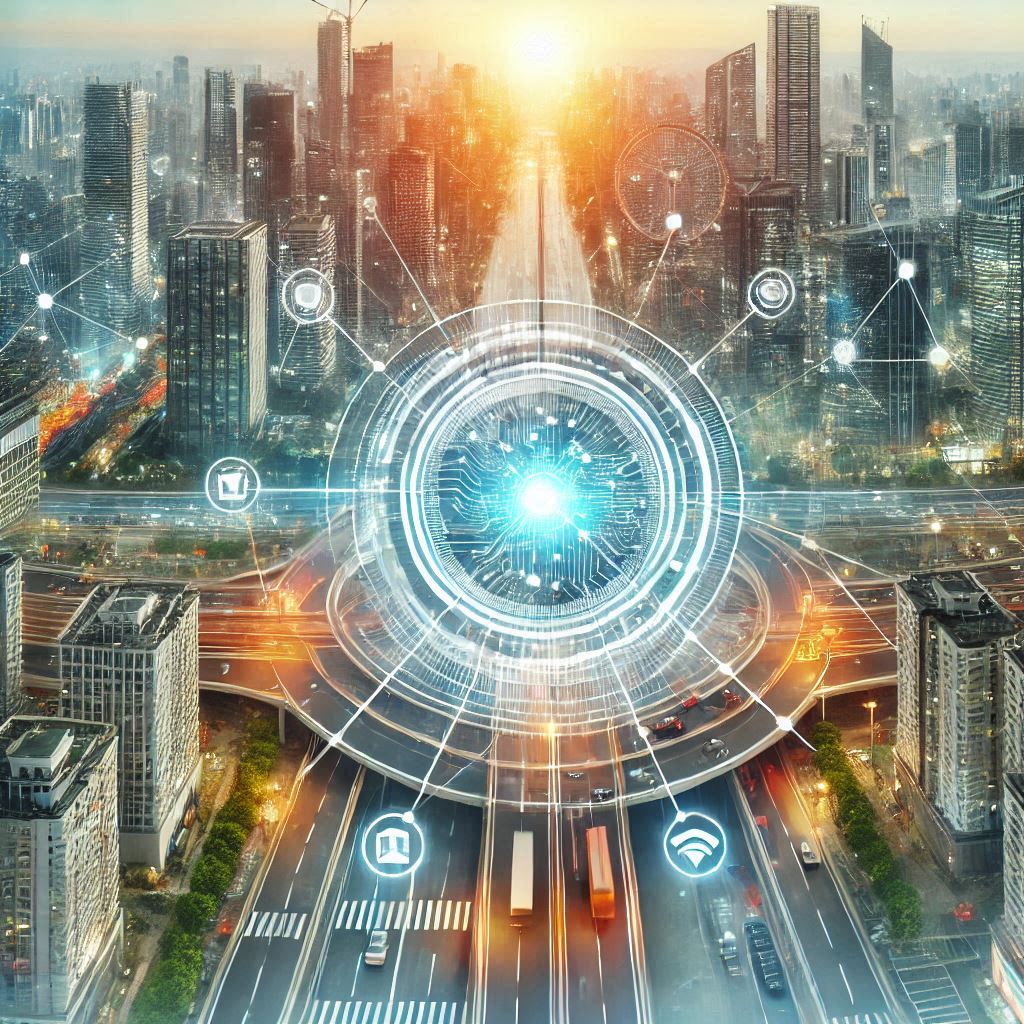The Role of AI in Smart
As urbanization continues to accelerate, cities around the world are facing unprecedented challenges. From traffic congestion and pollution to resource management and public safety, the complexities of modern urban life demand innovative solutions. Enter Artificial Intelligence (AI), a transformative technology that is reshaping the way cities are planned, managed, and experienced. This blog explores the role of AI in smart cities and urban planning, highlighting its potential to create more efficient, sustainable, and livable urban environments.

What is a Smart City?
A smart city leverages technology and data to improve the quality of life for its residents, enhance the efficiency of urban services, and promote sustainability. By integrating AI, the Internet of Things (IoT), and other advanced technologies, smart cities can optimize resource usage, reduce environmental impact, and provide better services to their inhabitants. (The Role of AI in Smart)
AI in Urban Planning
Urban planning involves designing and organizing urban spaces to meet the needs of the population while considering factors such as infrastructure, transportation, housing, and environmental sustainability. AI plays a crucial role in enhancing urban planning processes through:
- Data Analysis and Predictive Modeling:
- AI algorithms can analyze vast amounts of data from various sources, such as satellite imagery, social media, and sensors, to identify patterns and trends. This data-driven approach enables urban planners to make informed decisions and predict future urbanization trends. (The Role of AI in Smart)
- Simulation and Scenario Planning:
- AI-powered simulation tools allow planners to create virtual models of urban environments and test different scenarios. This helps in understanding the potential impact of various planning decisions, such as the construction of new infrastructure or changes in zoning regulations.
- Optimization of Land Use:
- AI can optimize land use by analyzing factors such as population density, transportation networks, and environmental constraints. This ensures that urban spaces are utilized efficiently, reducing sprawl and promoting sustainable development. (The Role of AI in Smart)
AI in Smart City Management
Once a city is planned, AI continues to play a vital role in its management and operation. Key applications of AI in smart city management include:
- Traffic Management:
- AI-powered traffic management systems use real-time data from cameras, sensors, and GPS devices to monitor traffic flow and optimize signal timings. This reduces congestion, minimizes travel time, and lowers emissions. (The Role of AI in Smart)
- Public Safety:
- AI enhances public safety through predictive policing, surveillance, and emergency response systems. By analyzing crime data and identifying patterns, AI can help law enforcement agencies allocate resources more effectively and prevent incidents before they occur.
- Energy Management:
- AI-driven energy management systems optimize the use of electricity, water, and other resources. Smart grids, for example, use AI to balance supply and demand, reduce energy waste, and integrate renewable energy sources. (The Role of AI in Smart)
- Waste Management:
- AI can improve waste collection and recycling processes by analyzing data on waste generation and optimizing collection routes. This leads to more efficient waste management and reduced environmental impact. (The Role of AI in Smart)
AI and Citizen Engagement
A key aspect of smart cities is the active involvement of citizens in urban governance. AI facilitates citizen engagement through:
- Smart Applications:
- AI-powered mobile applications provide residents with real-time information on public services, transportation, and environmental conditions. These apps enable citizens to report issues, provide feedback, and participate in decision-making processes. (The Role of AI in Smart)
- Social Media Analysis:
- AI can analyze social media data to gauge public sentiment and identify emerging issues. This helps city authorities understand the needs and concerns of residents and respond proactively.
- Participatory Planning:
- AI-driven platforms enable collaborative urban planning by allowing citizens to contribute ideas and feedback. This ensures that urban development aligns with the preferences and needs of the community.
Challenges and Considerations
While AI offers numerous benefits for smart cities and urban planning, it also presents challenges that need to be addressed:
- Data Privacy and Security:
- The extensive use of data in smart cities raises concerns about privacy and security. Ensuring that data is collected, stored, and used responsibly is crucial to maintaining public trust.
- Digital Divide:
- The benefits of AI and smart city technologies may not be equally accessible to all residents. Addressing the digital divide and ensuring that all citizens can participate in and benefit from smart city initiatives is essential.
- Ethical Considerations:
- The use of AI in urban planning and management must be guided by ethical principles. This includes ensuring transparency, accountability, and fairness in AI algorithms and decision-making processes.
Future Outlook
The integration of AI in smart cities and urban planning is still in its early stages, but the potential is immense. As technology continues to advance, AI will play an increasingly important role in creating cities that are more efficient, sustainable, and responsive to the needs of their residents. By embracing AI, urban planners and city managers can address the challenges of urbanization and build cities that are not only smart but also inclusive and resilient.

Conclusion
AI is revolutionizing the way cities are planned and managed, offering innovative solutions to complex urban challenges. From optimizing traffic flow and energy use to enhancing public safety and citizen engagement, AI has the potential to transform urban environments for the better. As we move towards a future where smart cities become the norm, the role of AI will be pivotal in shaping urban landscapes that are sustainable, efficient, and livable for all.
Social Media handles (Facebook, Linkedin, Twitter
Go to our Website for News and Articles: https://informtoyou.com/


